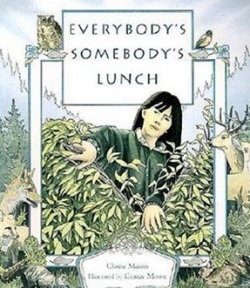Search for Resources
Description
This richly illustrated story blends First Nation wisdom about the natural world and traditional storytelling. A young girl loses her cat "Mouser" in the forest. As she searches for Mouser she stops and looks at all of the plants and animals that she loves so much and thinks about how the forest provides food for her family. Suddenly, she discovers Mouser's collar and comes to the horrible realization that something has killed her cat. She notices the hunters in the forest such as the shrew and the spider and is saddened by all of the death surrounding her. As the young girl is comforted by her father he reminds her about the natural relationship between predators and prey. He explains how predators sometimes get a bad name, but that they are not to be feared and are a necessary part of keeping our ecosystems balanced. Everything needs to eat and students learn that in accordance with First Nations wisdom the predator prey connection is "the sacred way of the earth".
General Assessment
Recommendation of how and where to use it
The focus on traditional ecological knowledge in this story makes it a valuable addition to lessons on First Nations culture. The book would also make a great introduction to a unit on habitats and food chains. Students could use the animal species in the books as the basis for creating their own food chains. They could predict what wiould happen to the other species in the food chain if one species was removed. Students could also select one of the animals from the book and do a research project where they investigate and write about how that animal is adapted to living in its habitat. This story is supported by an accompanying teacher's guide which can be purchased. The teacher's guide contains lessons about predator-prey relationships and food chains/webs.
Relevant Curriculum Units
The following tool will allow you to explore the relevant curriculum matches for this resource. To start, select a province listed below.
- Step 1Select a province
- Alberta
- British Columbia
- Step 2Select a grade level
- Grade 3
- Step 3Select a subject
- Science
- Step 4Relevant matches
- Science 3: Living things are diverse, can be grouped, and interact in their ecosystems
- Grade 4
- Step 3Select a subject
- Science
- Step 4Relevant matches
- Science 4: All living things sense and respond to their environment
- Manitoba
- Step 2Select a grade level
- Grade 3
- Step 3Select a subject
- Indigenous Languages and Cultures
- Step 4Relevant matches
- Cultural and Linguistic Diversity: Specific Aboriginal Culture
- Grade 4
- Step 3Select a subject
- Indigenous Languages and Cultures
- Step 4Relevant matches
- Cultural and Linguistic Diversity: Specific Aboriginal Culture
- Science
- Step 4Relevant matches
- Habitat and Communities
- Grade 5
- Step 3Select a subject
- Indigenous Languages and Cultures
- Step 4Relevant matches
- Cultural and Linguistic Diversity: Specific Aboriginal Culture
- Newfoundland & Labrador
- Northwest Territories
- Step 2Select a grade level
- Grade 3
- Step 3Select a subject
- Indigenous Languages and Cultures
- Step 4Relevant matches
- Dene Kede: The Land
- Grade 4
- Step 3Select a subject
- Indigenous Languages and Cultures
- Step 4Relevant matches
- Dene Kede: The Land
- Science
- Step 4Relevant matches
- Life Systems: Habitats & Communities
- Science 4: All living things sense and respond to their environment
- Grade 5
- Step 3Select a subject
- Indigenous Languages and Cultures
- Step 4Relevant matches
- Dene Kede: The Land
- Nova Scotia
- Nunavut
- Step 2Select a grade level
- Grade 4
- Step 3Select a subject
- Indigenous Languages and Cultures
- Step 4Relevant matches
- Relationship to the Environment
- Science
- Step 4Relevant matches
- Life Systems: Habitats & Communities
- Prince Edward Island
- Saskatchewan
- Yukon Territory
- Step 2Select a grade level
- Grade 3
- Step 3Select a subject
- Science
- Step 4Relevant matches
- Science 3: Living things are diverse, can be grouped, and interact in their ecosystems
- Grade 4
- Step 3Select a subject
- Science
- Step 4Relevant matches
- Science 4: All living things sense and respond to their environment
Themes Addressed
Ecosystems (2)
- Appreciating the Natural World
- Interdependence
Indigenous Knowledge (2)
- Rituals, Spirituality and Worldviews
- TEK -- Traditional Ecological Knowledge

